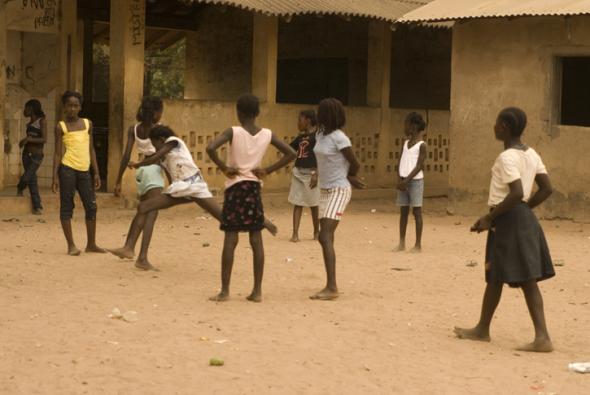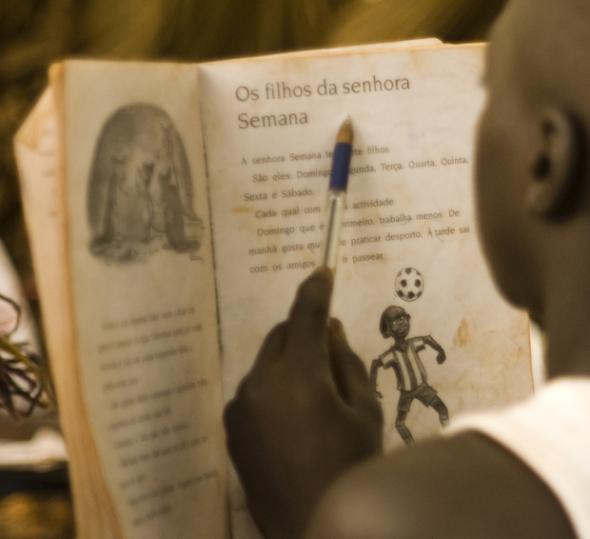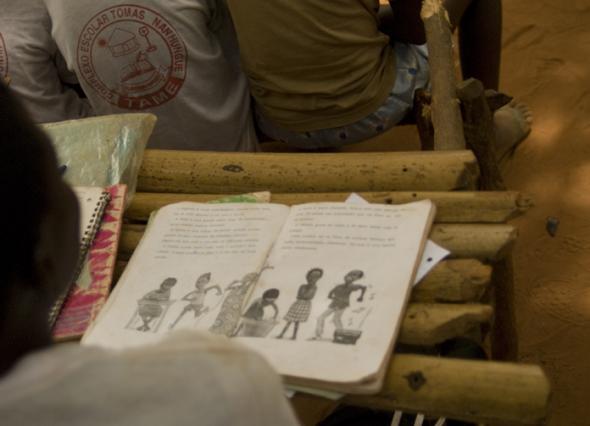The creole as a strategy of development
 Development is a permanently changing concept, and eventually victim of what it do tries to identify. At the end of the Second World War, with the beginning of the postcolonial paradigm, the economy went in search for it, fearing what that period could be. From that moment on, the world became to be watched from a modernist, evolutionist perspective, committing ourselves to the identification of the growth steps of the countries, from the most primitive to the most advanced: the Africans, Latino-Americans and Asians, on an edge - the contemptible one -, the “Westerners” on the other - the ideal one. It is not necessary to sing great considerations about the ethnocentrism of this approach, but it is important to have it in mind to reflect about the dominant thought of the time when this sub-discipline of the western economic science formed. One of the books taught to all those who want to learn development economics in the “best economics departments of their countries” was written by Rostow in 1959 with the title: “The Stages of Economic Growth: a non-communist manifesto”.
Development is a permanently changing concept, and eventually victim of what it do tries to identify. At the end of the Second World War, with the beginning of the postcolonial paradigm, the economy went in search for it, fearing what that period could be. From that moment on, the world became to be watched from a modernist, evolutionist perspective, committing ourselves to the identification of the growth steps of the countries, from the most primitive to the most advanced: the Africans, Latino-Americans and Asians, on an edge - the contemptible one -, the “Westerners” on the other - the ideal one. It is not necessary to sing great considerations about the ethnocentrism of this approach, but it is important to have it in mind to reflect about the dominant thought of the time when this sub-discipline of the western economic science formed. One of the books taught to all those who want to learn development economics in the “best economics departments of their countries” was written by Rostow in 1959 with the title: “The Stages of Economic Growth: a non-communist manifesto”.

This philosophic vision, deeply characterized by enlightenment and modernist concepts (based upon a blind faith on the idea of the absolute truth) and whose interests coincided with the western economic and political interests of the ruling structures, explored the concept of growth above mentioned and put it into practice.
In this context, we can understand the insistence on imposing european languages as official languages in the ex-colonies, with the justification that they only could allow progress and modernity. They had various functions, among others: reducing at the lowest level the easiest communication processes between citizens and the State; granting the perpetuation of the failure of education systems through maintaining the domination system of local elites - those that were already part of the european colonial system and that, in the postcolonial period, continued supporting it; building the base of the legal, economic, political and institutional system, which has looked since the beginning at the countries of the North, at the metropolitan state, thus perpetuating dependence and, through it, exploration, just the same as it was during colonization, for the only thing that changes is the color of the elites’ faces.
The creole, as a language, arose from the communication needs of colonized societies with the colonizer regime, being the language of national unity in many countries. Considering their own mother tongues as little useful, colonized societies recurred to the linguistic knowledge of the imposed model to build a simpler form of vehicular language, which we nowadays call creole. Ulf Hannerz, an author that examined the concept of creolization, asserts that cultures can be seen no more as limited or autonomous, once the complex and asymmetric transcultural fluxes have transformed them (1992 : 264). The same author says we live in a “creolized world”, not susceptible of resulting in a global homogenization.

Consequently, the creolization creates a greater affinity among cultures, because some of their new cultural products have become more and more attractive on the global market (Hannerz 1992 : 265-6) - e.g. african music, a typically creolized one, which turned into “world music”. Nevertheless, the hybridization processes that occur on the musical and even gastronomic side, do not happen on the linguistic side. Carlos Lopes, talking about the portuguese ex-colonies of Guinea Bissau and Cape Verde, deduced that “during the long colonial night the creole was systematically despised, considered as a dialect that could be tracked back to Portuguese, spoken by Africans, prohibited in the education system” (1988 : 227). Thus, suppressed during the colonial regime, it had a strong expansion with the liberation movement, which used it to pass its independentist message. But at the present time, although it is an autonomous language from a grammatical and lexical point of view, the creole is not recognized as a language of the education system, nor there are visible efforts in order to consolidate its written codification. However, it is systematically used by the government, Churches, NGOs and private companies whenever they want to reach the most of the population. Consequently, electoral, advertisement or evangelist campaigns are written in creole, as well as it is the language used in the “spoken” medias (radio and television).
The construction of a development model based upon a distant language spoken just by minorities maintains disconnected the social and productive web, and limits the mechanisms of knowledge transmission. In fact, it makes the school an inadequate space for a profitable learning, a space encompassed by languages that existed for communities only in the abstract, turning difficult the construction of identity and thus perpetuating the deterritorialization process begun with colonization. The distance between the education imparted by different institutions and the population, through the simple linguistic limitation, weakens the contestation movements. On the other hand, it turns difficult the construction of an economic system that gives value to what do already exists in the society and continues being ignored, while maintaining the idea that what is worth comes from the outside, i.e., the distant language, dollars or marks, foreign products, etc.

Consequently, the societies of the so-called developing countries are prevented from becoming autonomous, and they are maintained as long as possible in a relationship of dependence with the metropolitan country, through considering, on a theoretical ground (the one of these economic models that examine people and societies that do not exist), as being on the same level the one near there and the one whose face we do not know (and that at times neither has one, as the notorious international markets to which cotton, coffee, coke, and many other products are sold everyday), while from a practical side the differential of capital does the rest. The vulnerability is perpetuated, and with it the negotiation power of those who are more dependent lowers, because the rules of abstract institutions tell them everyday what they have not. Thus we are in front of a development model in which the “linguistic strategy” in force gives its strong contribution, transforming the native into a landless, into an expropriated being, and giving way to the process described by David Harvey - “accumulation by dispossession” -, which forces him to displace where his work is needed, thus thickening the reserve industrial army, available to receive in change of his work the least possible amount to grant his subsistence.
Will the affirmation of the creole as official language be essential for the development of African countries? Yes, sure! But for this we need to give a new understanding of the development concept (inside of a perspective of western economic science, and which is already part of other social sciences), meaning with it just the process through which people gain control of their own lives (Erisken, 2001). In this approach, the creole may contribute in two different ways: as differentiating character and as source for the construction of identity, without negating to it the languages and dialects that constitute its base (on the contrary, accepting the regional character of the creole, the languages of that same region are accepted). For this reason, the creole must not be formalized in the same way as languages were in other places, avoiding the forced repetition of historical processes in the image of those that carried to the formalization (and conceptualization) of european languages. Furthermore, we need to see the creole as an englobing element, one that promotes openness, sharing (not of the language itself, because the creole itself is defined as multiple, but of what the concept reflects), and the cooperation among different communities, who in this way will benefit both of geo-economic proximity and of a common colonial past which left them this linguistic heritage that may work as an element of “neighborhood”. It is through the strengthening of these connections that the traditional relationships of dependence with the countries of the North will be overcome.
Bibliography
Augel, Johannes (1997). O crioulo na Guiné-Bissau. Afro-Ásia, 19/20,p.251-254.
Augel, Moema Parente (2006). O crioulo guineense e a oratura. Scripta. Belo Horizonte,v.10 nº19, p.69-91.
Eriksen, Thomas Hylland (2001), “Between Universalism and Relativism: a Critique of the UNESCO Concept of Culture”, in: Cowan, Jane K., Marie-Benedicte Dembour, and Richard Wilson (eds.), “Culture and rights : anthropological perspectives”, Cambridge University Press, pp. 127 – 148.
Hannerz, Ulf. Cultural complexity: studies in the social organization of meaning. New York: Columbia University Press, 1992.
Laranjeiro, Catarina (2011). A urgência do Crioulo Guinnese. Buala. Cultura Contemporânea Africana.
Lopes, Carlos (1988). Para uma leitura sociológica da Guiné-Bissau. Bissau: Inep.
Rostow, W. W. (1990), “The Stages of Economic Growth: A Non-Communist Manifesto”, Cambridge University Press (originally published in 1960).
Scantamburlo, Luigi (1997). Introdução ao dicionário guineense português. Lisboa: Universidade Nova de Lisboa.